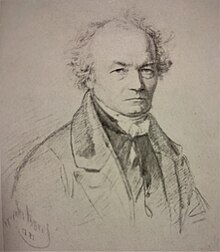František Horčička


František Horčička (or Franz Horcziczka) (1776–1856) born in Prague June 29, 1776 and died in Prague April 5, 1856. Czech history and portrait painter. Along with painters Antonín Machek and František Tkadlík and sculptor Václav Prachner, he was among the first local artists to reimagine Neoclassicism using Romantic ideas. Horčička turned to painting in the private painter´s studio of Ludvík Kohl (beginning 1786) and after graduating from philosophy and law on the Charles University. In 1800 he entered new founded Academy of arts in Prague as a pupil of Josef Bergler.
He was much in demand around Prague as a portraitist of the intelligentsia. He also worked as an art restorer, notably in restoring some pieces from the gallery of Prague Castle and rich collections of paintings of the Colloredo-Mansfeld family, both in their Prague Palace and north-Bohemian castle Opočno. He made a large catalogue of their galleries.[1]
His father-in-law was historian František Martin Pelcl. Josef Dobrovský, Bernard Bolzano or Jan Evangelista Purkyně or Adam Bittner were among his friends, he portrayed them without any idealisation. He interested in every human face: already in 1816 portrayed the killer Masson shortly before his execution[2] his philosophical and enlightenment overview was compared with Henry Fuseli.[3] Considered the most important portrait painter of his day after Antonín Machek until supplanted by Jacob Ginzel in 1822. His portraits were turned to graphics (steel engraving or lithography) by Georg Döbler or František Šír. He developed a valuable process for restoring pictures (technology of old masters oil painting using copal, encaustic).
Works
[edit]- Sacral themes: Saint Wenceslaus destroying the Slavic idol Swantovit; Saint Adalbert of Prague blessing his country; Saint George and the Dragon; The Last Judgment and Holy Trinity (in the cemetery church, Prague-Košíře)
- Portraits: Mathematician Franz Anton Gerstner, Abbe Josef Dobrovsky, slavist Václav Hanka, priest and poet Ignaz Cornova, historian František Martin Pelcl, the physiologist Jan Evangelista Purkyně; the physician and mycologist Julius Vincenz von Krombholz, the Archbishop of Prague Václav Leopold Chlumčanský (1815-1830), philosopher Bernard Bolzano, Hieronym earl of Colloredo-Mansfeld.
- Miniatures: Bavarian National Museum in Munich; Hortulus Animae, and several Codices restored by Horčička: Imperial Library, Vienna; Psalter and Officium in three Folio Volumes, Vatican, Rome. According to the suspicion he participated in the forgeries of the ancient Slavic Manuscripts of epic, found in Zelená Hora and Dvůr Králové (in The Library of the National Museum in Prague).
References
[edit]- ^ Complete edition with fascimile of original catalogue: Matouš Jirák, Miloš Buroň (editors), František Horčička - Katalog Colloredo-Mansfeldské obrazárny. NPÚ Praha 2018, ISBN 978-80-7480-117-6
- ^ Blažíčková-Horová, 2009, pp. 10-14
- ^ Nová encyklopedie českého výtvarného umění I., Academia Prague 1995, p. 283-284 (New encyclopaedia of the Czech art).
Bibliography
[edit]- Naděžda Blažíčková-Horová, ed. 19th-Century Art in Bohemia: (1790–1910) - Painting, Sculpture, Decorative Arts. Prague; National Gallery in Prague, 2009.
- "Oxford Art On Line". Oxford Grove Art. Oxford University Press. Retrieved 15 June 2011.
- G. K. Nagler: Neues allgemeines Künstler-Lexicon: oder Nachrichten ..., Berlin 1838, Tome 6, s. 310 [1]
